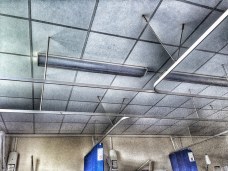 Imagine the scene. It has been a wearying time. You left your hotel room at 11:00am on the final day of your much-needed holiday. You spent a final few hours trying to enjoy the last dregs of the Mediterranean town you have inhabited for a week, but at the back of your mind a voice is chanting with increasing volume: “I just want to get back home …”
Imagine the scene. It has been a wearying time. You left your hotel room at 11:00am on the final day of your much-needed holiday. You spent a final few hours trying to enjoy the last dregs of the Mediterranean town you have inhabited for a week, but at the back of your mind a voice is chanting with increasing volume: “I just want to get back home …”
At 3:00pm you, your holiday rep, and your bags are thankfully reunited at the local airport for the 5:30pm flight. The temperature outside is just below 30C. The queues for the ham and cheese paninis and coffee are long, and the Mediterranean males are shouting and stomping as they serve, while their resigned women sit quietly and take the money. The airport lounge is overcrowded and there are not enough seats. “I just want to get home,” you say to yourself. “I just want to get home.”
And then the announcement. It came from nowhere.


 (Augst 26, 2016)
(Augst 26, 2016)
 If you were told several times that they were going to cut you open and even saw through your sternum to get to your heart, I wonder what would disturb you most?
If you were told several times that they were going to cut you open and even saw through your sternum to get to your heart, I wonder what would disturb you most? Don’t get me wrong, I have many, many reasons to be grateful to the NHS. It has saved my life on at least two occasions. I wouldn’t be here writing this today if it wasn’t for the skill and care of paramedics, nurses, doctors, and surgeons. However, having just spent 19 days in four hospital beds on four wards in two hospitals, I have had plenty of time to reflect as I gazed at the ceilings. My random observations are listed below.
Don’t get me wrong, I have many, many reasons to be grateful to the NHS. It has saved my life on at least two occasions. I wouldn’t be here writing this today if it wasn’t for the skill and care of paramedics, nurses, doctors, and surgeons. However, having just spent 19 days in four hospital beds on four wards in two hospitals, I have had plenty of time to reflect as I gazed at the ceilings. My random observations are listed below.